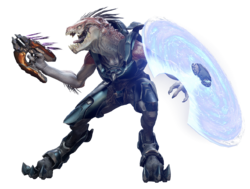Ibie'sh: Difference between revisions
From Halopedia, the Halo wiki
No edit summary |
NightHammer (talk | contribs) mNo edit summary |
||
| Line 1: | Line 1: | ||
{{Era|Covenant|Human|UNSC|HCW|Post}} | {{Era|Covenant|Human|UNSC|HCW|Post}} | ||
[[File:H5G-Render-Jackal.png|thumb|250px|A Jackal from Ibie'sh.]] | [[File:H5G-Render-Jackal.png|thumb|250px|A Jackal from Ibie'sh.]] | ||
'''Ibie'sh''' is a somewhat isolated, volcanic continent on the [[Kig-Yar]] homeworld of [[Eayn]], home to the Kig-Yar subtype known as '''Ibie'shans'''. The continent is rarely visited by outsiders, leading to the Ibie'shans developing in isolation.<ref name="wp kig">[https://www.halowaypoint.com/en-us/universe/species/kig-yar '''Halo Waypoint''': ''Kig-Yar'']</ref> The majority of the Kig-Yar serving in [[Jul 'Mdama]]'s [[Jul 'Mdama's Covenant faction|reformed Covenant]] can trace their ancestry there. More noticeably reptilian than other Kig-Yar, the Jackals of Ibie'sh show the least physical change from the species' common ancestor of all of the three main varieties of Kig-Yar, the other two having evolved more noticeably avian features.<ref name="wp kig"/> They have blunt beaks similar to those of the [[T'vaoan]]s, though their maws are much larger. Their necks are far more muscular than those of other known Kig-Yar breeds.<ref name="VIS">'''[[Halo 4: The Essential Visual Guide]]''', ''page ??''</ref><ref>[https://forums.halowaypoint.com/yaf_postsm2988575_Catalog-Interaction.aspx#post2988575 '''Halo Waypoint''': ''Catalog Interaction - Page 39'']</ref> Despite their major physiological differences, the Ibi'eshans are capable of interbreeding with the other Kig-Yar subtypes and have no marked cognitive differences.<ref name="wp kig"/> | '''Ibie'sh''' is a somewhat isolated, volcanic continent on the [[Kig-Yar]] homeworld of [[Eayn]], home to the Kig-Yar subtype known as '''Ibie'shans'''. The continent is rarely visited by outsiders, leading to the Ibie'shans developing in isolation.<ref name="wp kig">[https://www.halowaypoint.com/en-us/universe/species/kig-yar '''Halo Waypoint''': ''Kig-Yar'']</ref> The majority of the Kig-Yar serving in [[Jul 'Mdama]]'s [[Jul 'Mdama's Covenant faction|reformed Covenant]] can trace their ancestry there. More noticeably reptilian than other Kig-Yar, the Jackals of Ibie'sh show the least physical change from the species' common ancestor of all of the three main varieties of Kig-Yar, the other two having evolved more noticeably avian features.<ref name="wp kig"/> They have blunt beaks similar to those of the [[T'vaoan]]s, though their maws are much larger. Their necks are far more muscular than those of other known Kig-Yar breeds.<ref name="VIS">'''[[Halo 4: The Essential Visual Guide]]''', ''page ??''</ref><ref>[https://forums.halowaypoint.com/yaf_postsm2988575_Catalog-Interaction.aspx#post2988575 '''Halo Waypoint''': ''Catalog Interaction - Page 39'']</ref> Despite their major physiological differences, the Ibi'eshans are capable of interbreeding with the other Kig-Yar subtypes and have no marked cognitive differences.<ref name="wp kig"/> | ||
Revision as of 19:18, March 5, 2019
Ibie'sh is a somewhat isolated, volcanic continent on the Kig-Yar homeworld of Eayn, home to the Kig-Yar subtype known as Ibie'shans. The continent is rarely visited by outsiders, leading to the Ibie'shans developing in isolation.[1] The majority of the Kig-Yar serving in Jul 'Mdama's reformed Covenant can trace their ancestry there. More noticeably reptilian than other Kig-Yar, the Jackals of Ibie'sh show the least physical change from the species' common ancestor of all of the three main varieties of Kig-Yar, the other two having evolved more noticeably avian features.[1] They have blunt beaks similar to those of the T'vaoans, though their maws are much larger. Their necks are far more muscular than those of other known Kig-Yar breeds.[2][3] Despite their major physiological differences, the Ibi'eshans are capable of interbreeding with the other Kig-Yar subtypes and have no marked cognitive differences.[1]
